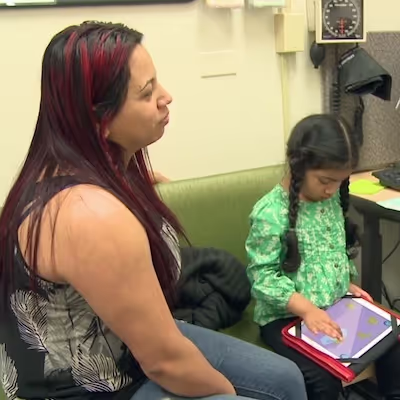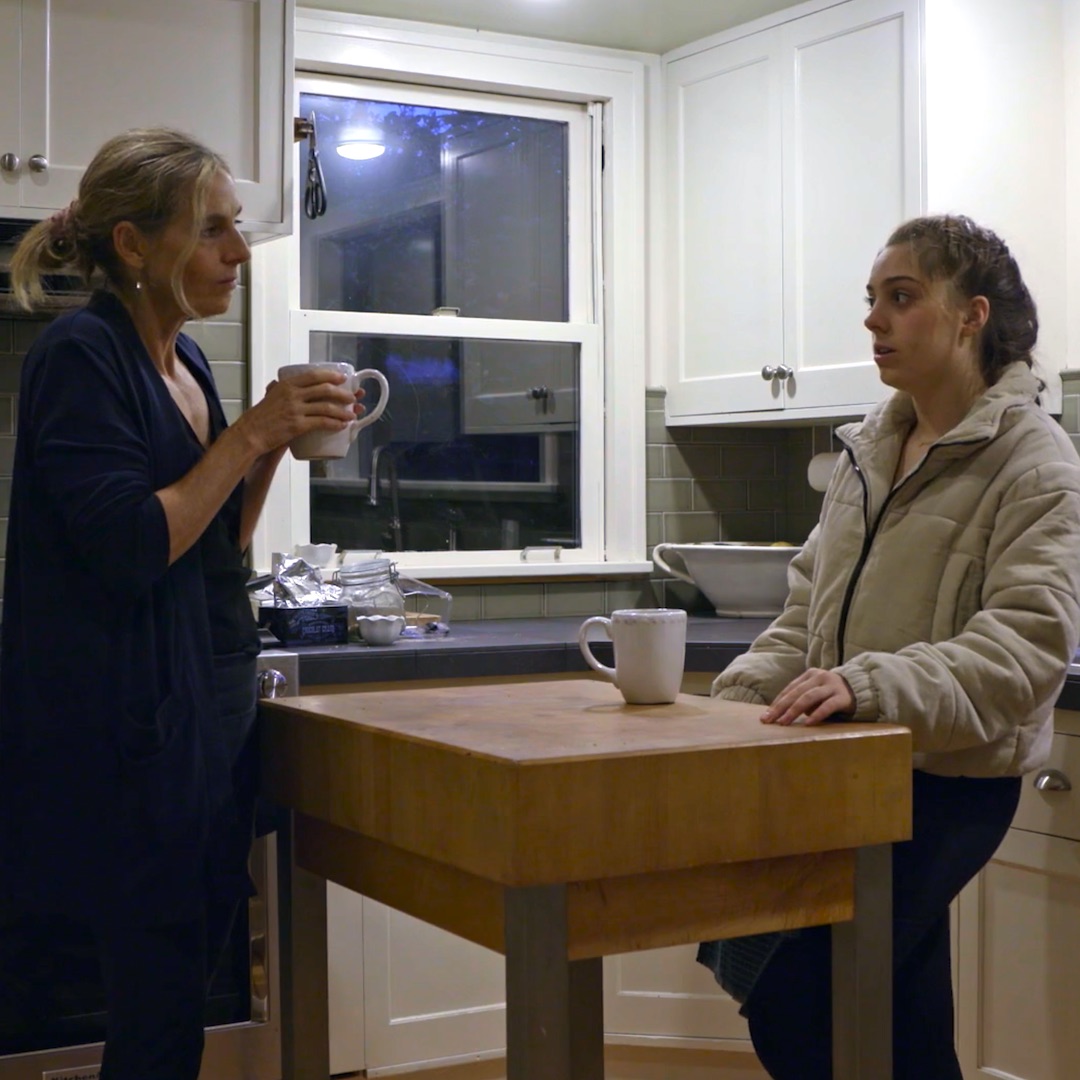


I mentioned to some colleagues recently how surprised I was that so many parents give kids screens to keep them occupied during a doctor’s visit. By being on a screen, the parents are missing out on an opportunity to have their children experience the health profession, to be present during the exam and interact with the whole health team.
About an hour later I had a big “aha” moment. What if all pediatricians in the country have signs in the waiting room that said something like the following:
"For children’s development, having times off screens is important. This doctor’s office is a ‘screen-free zone’ for kids. We want them to be engaged in the visit and who knows—maybe they will want to go into the healthcare profession someday."
Clearly, if a child is frantic without a screen certain exceptions would apply—and this would be a good time to screen a family about screen-time rules.
My family has several screen-free zones: the car (exceptions are made for Google Maps) and the bedrooms at bedtime. My daughter, Tessa's room, is mainly a screen-free zone which includes her cell phone.
It is one thing to say a place is screen-free, and it is quite another to enforce it—I get it! For schools, I have been learning of more and more teachers using hanging pocket organizers where students put their phones when they walk into the classroom. Enforcing at home is tricky too—it is all about the frequent calm conversations which is why we do TTTs.
Learn more about showing our movies in your school or community!
Join Screenagers filmmaker Delaney Ruston MD for our latest Podcast

Learn more about our Screen-Free Sleep campaign at the website!
Our movie made for parents and educators of younger kids
Learn more about showing our movies in your school or community!
Learn more about showing our movies in your school or community!
Join Screenagers filmmaker Delaney Ruston MD for our latest Podcast

Learn more about our Screen-Free Sleep campaign at the website!
Our movie made for parents and educators of younger kids
Join Screenagers filmmaker Delaney Ruston MD for our latest Podcast
As we’re about to celebrate 10 years of Screenagers, we want to hear what’s been most helpful and what you’d like to see next.
Please click here to share your thoughts with us in our community survey. It only takes 5–10 minutes, and everyone who completes it will be entered to win one of five $50 Amazon vouchers.
I mentioned to some colleagues recently how surprised I was that so many parents give kids screens to keep them occupied during a doctor’s visit. By being on a screen, the parents are missing out on an opportunity to have their children experience the health profession, to be present during the exam and interact with the whole health team.
About an hour later I had a big “aha” moment. What if all pediatricians in the country have signs in the waiting room that said something like the following:
"For children’s development, having times off screens is important. This doctor’s office is a ‘screen-free zone’ for kids. We want them to be engaged in the visit and who knows—maybe they will want to go into the healthcare profession someday."
Clearly, if a child is frantic without a screen certain exceptions would apply—and this would be a good time to screen a family about screen-time rules.
My family has several screen-free zones: the car (exceptions are made for Google Maps) and the bedrooms at bedtime. My daughter, Tessa's room, is mainly a screen-free zone which includes her cell phone.
It is one thing to say a place is screen-free, and it is quite another to enforce it—I get it! For schools, I have been learning of more and more teachers using hanging pocket organizers where students put their phones when they walk into the classroom. Enforcing at home is tricky too—it is all about the frequent calm conversations which is why we do TTTs.
Sign up here to receive the weekly Tech Talk Tuesdays newsletter from Screenagers filmmaker Delaney Ruston MD.
We respect your privacy.
I mentioned to some colleagues recently how surprised I was that so many parents give kids screens to keep them occupied during a doctor’s visit. By being on a screen, the parents are missing out on an opportunity to have their children experience the health profession, to be present during the exam and interact with the whole health team.
About an hour later I had a big “aha” moment. What if all pediatricians in the country have signs in the waiting room that said something like the following:
"For children’s development, having times off screens is important. This doctor’s office is a ‘screen-free zone’ for kids. We want them to be engaged in the visit and who knows—maybe they will want to go into the healthcare profession someday."
Clearly, if a child is frantic without a screen certain exceptions would apply—and this would be a good time to screen a family about screen-time rules.
My family has several screen-free zones: the car (exceptions are made for Google Maps) and the bedrooms at bedtime. My daughter, Tessa's room, is mainly a screen-free zone which includes her cell phone.
It is one thing to say a place is screen-free, and it is quite another to enforce it—I get it! For schools, I have been learning of more and more teachers using hanging pocket organizers where students put their phones when they walk into the classroom. Enforcing at home is tricky too—it is all about the frequent calm conversations which is why we do TTTs.

When teens say they hate you, it often feels personal, but it may not truly be about you. Teens sometimes direct their overwhelming feelings toward the safest person in their life. Instead of responding with logic or backing down out of fear, check that your limits are fair, practice self-compassion, and focus on validation rather than correction. If conflict feels stuck, family counseling can help both sides feel heard and understood.
READ MORE >
Thoughtful family tech rules help protect kids’ wellbeing, learning, and sleep while strengthening connection at home. Using the fresh start of a new year, this post shares eight practical tech habits families can discuss and adapt together, including shared social media check-ins, screen time inventories, device-free meals, regular gaming breaks, and keeping phones out of bedrooms at night.
READ MORE >
Psychologist Jean Twenge explains how parental controls can support healthier tech use by protecting sleep, limiting late night device access, and reducing kids’ exposure to content they are not developmentally ready to handle. She discusses why third party parental control tools are often more effective and easier to use than built in options, while acknowledging that no system is perfect. Clear boundaries, combined with technology based limits, can reduce ongoing conflict and make screen time rules easier to enforce.
READ MORE >for more like this, DR. DELANEY RUSTON'S NEW BOOK, PARENTING IN THE SCREEN AGE, IS THE DEFINITIVE GUIDE FOR TODAY’S PARENTS. WITH INSIGHTS ON SCREEN TIME FROM RESEARCHERS, INPUT FROM KIDS & TEENS, THIS BOOK IS PACKED WITH SOLUTIONS FOR HOW TO START AND SUSTAIN PRODUCTIVE FAMILY TALKS ABOUT TECHNOLOGY AND IT’S IMPACT ON OUR MENTAL WELLBEING.
